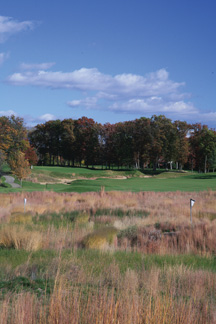TPC Twin Cities Honored With GCSAA/Golf Digest Environmental Leaders In Golf Chapter Award
Demonstrating the PGA TOUR’s commitment to environmental excellence, the TOUR’s TPC Twin Cities in Blaine, MN – home to the Champions Tour’s 3M Championship – has been named a Chapter Award winner in the annual Golf Course Superintendents Association of America (GCSAA)/Golf Digest Environmental Leaders in Golf Awards for 2008, presented in partnership with Syngenta Professional Products and Rain Bird – Golf Division. The club was recognized alongside TPC Twin Cities Golf Course Superintendent Roger Stewart, Jr., CGCS. This is the fifth consecutive year that TPC Twin Cities has been honored with an Environmental Leaders in Golf Award.
An independent panel of judges representing national environmental groups, turf grass experts, university researchers and members of the golf community conducted the award selection. Superintendents and their courses were judged on overall course management excellence in the areas of resource conservation, water quality management, integrated pest management, wildlife/habitat management and education/outreach. Additionally, these categories were judged on sustainability, criticality, originality and technology implementation/use.
“We are very proud of Roger and his outstanding team of maintenance and agronomy professionals at TPC Twin Cities, who continue to demonstrate a sincere and unwavering commitment to preserve and protect the environment,” said TPC Twin Cities General Manager Alan Cull.
TPC Twin Cities was recognized in the Chapter Award/Private Division. Stewart and the club will be formally recognized during the GCSAA Education Conference and Golf Industry Show in New Orleans on Thursday, February 5. In addition, program sponsors will make donations to the Environmental Institute for Golf, the philanthropic organization of the GCSAA, in the names of all National and Chapter winners.
Named by Golf Digest among the best courses in the state, TPC Twin Cities’ championship golf course was designed by Arnold Palmer to blend seamlessly with the natural rolling terrain on the site of a former sod farm 15 miles north of Minneapolis/St. Paul. PGA TOUR player and Minnesota native Tom Lehman served as player consultant on the design of the course, which features Bentgrass tees, fairways and greens, native prairie grasses, picturesque wetlands and 27 bodies of water, all framed by stately stands of mature oak, spruce and pine trees.
Like the other clubs within the PGA TOUR’s TPC Network, TPC Twin Cities is certified as an official Audubon Cooperative Sanctuary System by Audubon International. Among its many innovative environmental practices, TPC Twin Cities is distinguished by its exemplary water management, resource conservation, wildlife/habitat preservation and educational outreach efforts. To reduce water usage, the club uses a state-of-the-art computerized irrigation system that monitors weather conditions and daily evaporation rates, to ensure it irrigates only when necessary; uses a water treatment system to lower bicarbonate levels in the water and soil to improve water use efficiency; and limits irrigation coverage in native areas to primary rough areas only.
Resource conservation efforts include using a Flowtronex PSI pumping station in its irrigation system that reduces electricity use by 15 to 20%; using electric golf carts exclusively; instituting an expansive recycling program; and reducing energy costs and usage by 50% in the clubhouse thanks to a geo-thermal environmental control heating and cooling system.
Additionally, TPC Twin Cities works to establish and maintain sustainable wetland ecosystems on the course by stabilizing pond banks, providing a food source for wildlife, and adding supplemental structures for wildlife such as nest boxes and wildlife piles to meet the needs of native species. In partnership with the Bluebird Recovery Program, the club created a bluebird trail consisting of 24 bluebird houses scattered throughout the course to promote nesting. Meanwhile, wildlife piles of brush and logs placed throughout the property provide a sanctuary for fox, rabbits, squirrels, birds and other animals. These efforts, and all of the club’s environmental practices, are communicated to members and the general public through an extensive educational outreach program that includes walking tours for elementary school students and the opportunity for the nearby Anoka Technical College to utilize the facility as part of its associate degree program in horticulture/turfgrass management.

